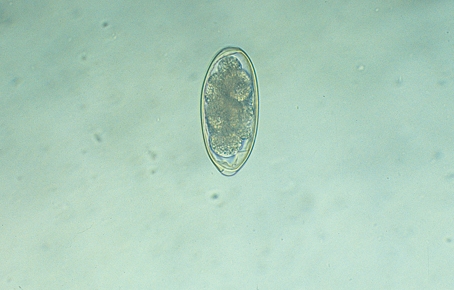Difference between revisions of "Avian Medicine Q&A 06"
| Line 3: | Line 3: | ||
|- | |- | ||
| align="center" | [[File:Manson_logo.gif|90px|Mansonlogo]] | | align="center" | [[File:Manson_logo.gif|90px|Mansonlogo]] | ||
| − | | align="left" | This question was provided by [[:Category:Manson|Manson Publishing]] as part of the [[OVAL Project]]. See more [[Category: Avian Medicine Q&A|Avian Medicine questions]] | + | | align="left" | This question was provided by [[:Category:Manson|Manson Publishing]] as part of the [[OVAL Project]]. See more [[:Category: Avian Medicine Q&A|Avian Medicine questions]] |
|} | |} | ||
<br><br><br> | <br><br><br> | ||
Latest revision as of 21:30, 2 August 2011
| This question was provided by Manson Publishing as part of the OVAL Project. See more Avian Medicine questions |
Large numbers of the pictured ovum shown above were found in smears made at postmortem examination from the proventriculus, small intestine and caecum of a pheasant aged eight weeks. However, no adult parasites were found in the digestive tract.
| Question | Answer | Article | |
| What is the name and location of the parasite producing these ova? | This is the ovum of the nematode Syngamus trachea – the gapeworm – a common parasite found in the trachea of gamebirds.
|
Link to Article | |
| Describe the clinical signs that may be seen in birds carrying large numbers of this parasite. | Affected birds ‘snick’, a combination of a sneeze, a cough and a sideways flick of the head. In heavy infestations the birds ‘gape’, i.e. extend their necks and gasp for breath through their opened beaks.
Mortality (especially amongst partridges), loss of weight, weakness, anaemia and reduced egg production may also be seen. |
Link to Article | |
| What differential diagnoses should be considered from these clinical signs? | The differential diagnoses should include mycoplasmosis and aspergillosis.
Mycoplasmosis is associated with swelling of the infraorbital sinus, between the eye and the nostril and around the eye. In gamebirds with aspergillosis there is usually silent gasping rather than the ‘snicking’ that occurs in birds with Syngamus trachea. |
Link to Article | |
| What treatment and control measures can be used? | Syngamiasis is most likely to be a problem in gamebirds kept on ground that has carried gamebirds in previous years. The parasite may use a direct life cycle, re-infecting the host species themselves, or use an indirect life-cycle, being taken up by earthworms, slugs and snails, in which they survive from one year to the next. Wild birds also act as reservoirs of infection.
Medication licensed and effective against Syngamus include anthelmintics of the benzimidazole group and nitroxynil. The benzimidazoles are best administered in the feed, nitroxynil is given in drinking water. Caution must be exercised in using nitroxynil which may result in toxicity, kidney damage and egg production problems; it is not recommended for use in birds over 17 weeks old. |
Link to Article | |
